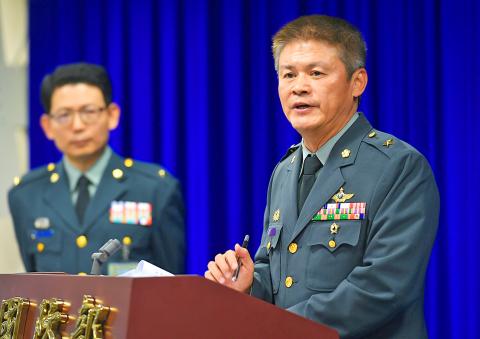The Ministry of National Defense yesterday said that corrosion woes with AH-64E Apache helicopters have led to the aircraft’s grounding, and Boeing, the US manufacturer, has dispatched a special task force to help identity and fix the problem.
Preliminary assessment found serious oxidation on metal components in the tail rotor gearbox, which led to nine of the Apaches being taken out of operations, said Major General Huang Kuo-ming (黃國明), commander of the Army Aviation Special Forces Command.
Twelve of the helicopters were reportedly also grounded due to parts shortages, leaving only eight of the fleet operational.

Photo: Chang Chia-ming, Taipei Times
“We noticed rust corrosion developing in the tail rotor gearbox in March, and notified the US side of the problem at that time. They were quite concerned, and have advised our side to apply several remedial measures to counteract the corrosion,” Huang said.
However, despite taking the remedial measures as part of regular maintenance and service work, the corrosion problem is persisting, which is why Boeing sent a special task force last month to perform a thorough check and safety inspection of all 29 helicopters, he said.
The inspection is ongoing and is expected to be completed by the end of next month, Huang said.
Officials said the Boeing task force is trying to determine into cause of the problem, which could be Taiwan’s wet and high humidity climate, seasonal monsoon rains blowing salt-laden ocean water inland, or improper maintenance and handling by ground service crew.
The AH-64E gearbox is made of a new aluminum-magnesium alloy, while the earlier AH-64D used an older type of aluminum alloy, and Boeing is also investigating the possibility that the corrosion problems stem from the new alloy, Huang said.

Alain Robert, known as the "French Spider-Man," praised Alex Honnold as exceptionally well-prepared after the US climber completed a free solo ascent of Taipei 101 yesterday. Robert said Honnold's ascent of the 508m-tall skyscraper in just more than one-and-a-half hours without using safety ropes or equipment was a remarkable achievement. "This is my life," he said in an interview conducted in French, adding that he liked the feeling of being "on the edge of danger." The 63-year-old Frenchman climbed Taipei 101 using ropes in December 2004, taking about four hours to reach the top. On a one-to-10 scale of difficulty, Robert said Taipei 101

Taiwanese and US defense groups are collaborating to introduce deployable, semi-autonomous manufacturing systems for drones and components in a boost to the nation’s supply chain resilience. Taiwan’s G-Tech Optroelectronics Corp subsidiary GTOC and the US’ Aerkomm Inc on Friday announced an agreement with fellow US-based Firestorm Lab to adopt the latter’s xCell, a technology featuring 3D printers fitted in 6.1m container units. The systems enable aerial platforms and parts to be produced in high volumes from dispersed nodes capable of rapid redeployment, to minimize the risk of enemy strikes and to meet field requirements, they said. Firestorm chief technology officer Ian Muceus said

MORE FALL: An investigation into one of Xi’s key cronies, part of a broader ‘anti-corruption’ drive, indicates that he might have a deep distrust in the military, an expert said China’s latest military purge underscores systemic risks in its shift from collective leadership to sole rule under Chinese President Xi Jinping (習近平), and could disrupt its chain of command and military capabilities, a national security official said yesterday. If decisionmaking within the Chinese Communist Party has become “irrational” under one-man rule, the Taiwan Strait and the regional situation must be approached with extreme caution, given unforeseen risks, they added. The anonymous official made the remarks as China’s Central Military Commission Vice Chairman Zhang Youxia (張又俠) and Joint Staff Department Chief of Staff Liu Zhenli (劉振立) were reportedly being investigated for suspected “serious

American climber Alex Honnold is to attempt a free climb of Taipei 101 today at 9am, with traffic closures around the skyscraper. To accommodate the climb attempt and filming, the Taipei Department of Transportation said traffic controls would be enforced around the Taipei 101 area. If weather conditions delay the climb, the restrictions would be pushed back to tomorrow. Traffic controls would be in place today from 7am to 11am around the Taipei 101 area, the department said. Songzhi Road would be fully closed in both directions between Songlian Road and Xinyi Road Sec 5, it said, adding that bidirectional traffic controls would